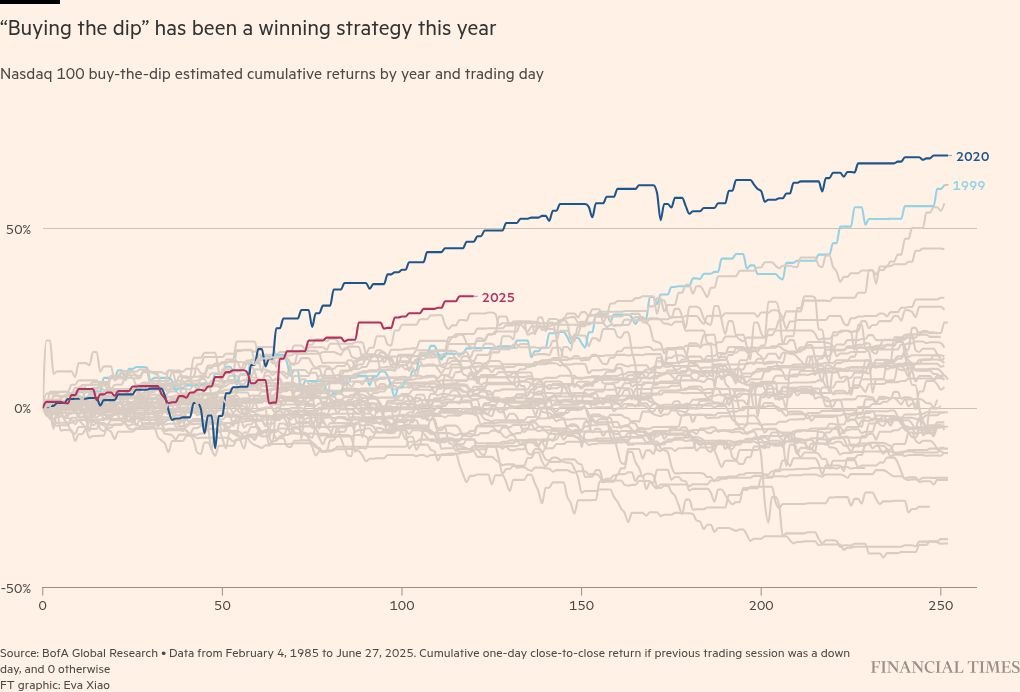Say goodbye to Excel spreadsheets, financial statements, and fancy Bloomberg terminals. Some everyday investors have a secret weapon that’s leading to winning stock picks.
Bob Vanscoy bought Nvidia in 2020, years before the AI boom propelled the company to its current position as the world’s most valuable company.
The 54-year-old father of two invested after observing his children playing video games during the pandemic. Vanscoy was surprised by the level of detail in the games.
“I got to thinking that these were becoming more than just games. They were becoming stories,” Vanscoy told Business Insider. “My kids told me Nvidia graphics cards were really, really popular and everyone was to get them.”
Fast forward to today, and Vanscoy holds 1,292 shares at a cost basis of $6.76 per share, brokerage statements viewed by Business Insider show. He’s notched a gain of 1,593.15% on his investment, which is worth about $147,977.
Vanscoy isn’t the only investor who’s made stock picks based on things his kids were into. Mikhaela Delahunty, a 42-year-old PR specialist, bought Crocs stock in 2022 after seeing the shoes everywhere.
“They were sold out, and my kids were begging me for some really strange colored plastic shoes,” Delahunty said. She did some more research, found that Crocs had recently completed an acquisition and posted strong earnings, and bought in.
While Delahunty sold out of her stock positions last year to free up liquidity to grow her business, her gut instinct was correct. Today, Crocs is rated favorably across Wall Street, with an over 60% buy rating among analysts, according to Bloomberg.
“The power that tweens have on the purchasing decisions of their parents is remarkable, and you can’t ever discount that,” Delahunty said.
Invest in what you know
While picking stocks based on vibes of the moment might seem a lot less precise than what the Wall Street pros are doing, it’s actually not that dar removed from traditional investing wisdom.
Related stories

Business Insider tells the innovative stories you want to know

Business Insider tells the innovative stories you want to know
As Warren Buffett famously advised: invest in what you understand.
Some retail investors have put this mindset into action by using their day jobs to glean investing insights. Etienne Breton, a 47-year-old technical expert at a manufacturing company, invested in Palantir after realizing the software company’s solutions were sorely needed at his job.
“I realized it could solve the exact problem I saw at my own job: data trapped in disconnected silos, with brittle patches, custom code, and no flexibility,” Breton said.
Another Palantir investor, 33-year-old Sherry Jiang, was drawn to the company because of her career ambitions.
“I was really curious about potentially working there, and I actually interviewed there,” Jiang said.
She ultimately took a job at Google instead. After a few years, Jiang left to start her personal finance company, Peek. But she kept tabs on Palantir and bought shares last year.
“I still follow Palantir because I really believe in their edge. It’s not just in the technology but also in their long-standing relationships with extremely sticky customers, like governments,” Jiang said.
Both Breton and Jiang’s bets have paid off handsomely. Breton has amassed 17,800 shares of Palantir, with some as low as $6 a share. While Jiang’s holding isn’t quite as large, her 218 shares of Palantir at a cost basis of $23 have delivered strong returns as the shares surged in recent months.
Ask an expert
What do the pros think about this strategy?
As it turns out, even some of Wall Street‘s biggest firms rely on similar instincts in addition to crunching numbers.
Analysts often conduct “channel checks” by visiting physical locations to observe foot traffic, customer activity, and site operations. So when Delahunty observed Crocs flying off the shelves, she was essentially doing her own version of a channel check.
Dan Egan, VP of behavioral finance and investing at the financial advisory company Betterment, says investors should proceed cautiously, but investing based on what you observe in your own day-to-day can indeed be a viable framework, especially for more casual investors.
“If you find it engaging and intellectually stimulating, and you like talking about investment strategies, it’s totally fine. Go ahead and do it,” Egan said.
However, he cautions investors against making this their primary method of investing. If your goal is to achieve risk-adjusted returns, staying diversified through ETFs, index funds, and broad asset allocation strategies is still the best move.
For retail investors looking to get some hands-on experience, paying attention to what’s around you and putting a little money behind it might be the most intuitive first step there is.







